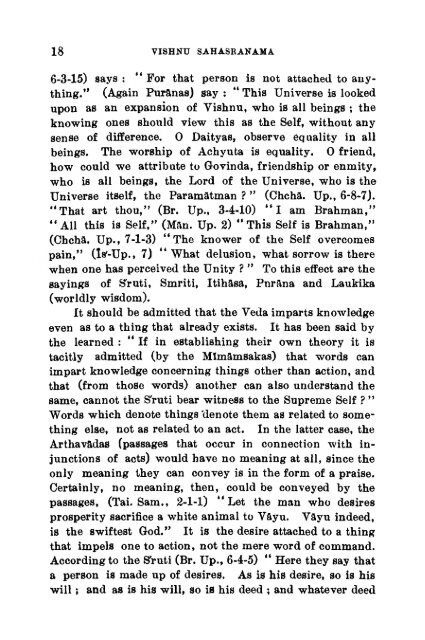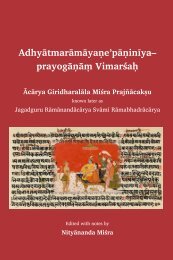Vishnu.Sahasranama.with.the.Bhasya.of.Sankaracharya_text
Vishnu.Sahasranama.with.the.Bhasya.of.Sankaracharya_text
Vishnu.Sahasranama.with.the.Bhasya.of.Sankaracharya_text
Create successful ePaper yourself
Turn your PDF publications into a flip-book with our unique Google optimized e-Paper software.
18<br />
VISHNU SAHASRANAMA<br />
6-3-15) says : " For that person is not attached to anything."<br />
(Again Puranas) say : " This Universe is looked<br />
upon as an expansion <strong>of</strong> <strong>Vishnu</strong>, who is all beings ; <strong>the</strong><br />
knowing ones should view this as <strong>the</strong> Self, <strong>with</strong>out any<br />
sense <strong>of</strong> difference. Daityas, observe equality in all<br />
beings. The worship <strong>of</strong> Achyuta is equality. friend,<br />
how could we attribute to Govinda, friendship or enmity,<br />
who is all beings, <strong>the</strong> Lord <strong>of</strong> <strong>the</strong> Universe, who is <strong>the</strong><br />
Universe itself, <strong>the</strong> Paramatman ? " (Chcha. Up., 6-8-7 J.<br />
"That art thou," (Br. Up., 3-4-10) 4,<br />
I am Brahman,"<br />
"All this is Self," (Man. Up. 2) "This Self is Brahman,"<br />
(Chcha. Up., 7-1-3) "The knower <strong>of</strong> <strong>the</strong> Self overcomes<br />
pain," (ls'-Up., 7) " What delusion, what sorrow is <strong>the</strong>re<br />
when one has perceived <strong>the</strong> Unity ? " To this effect are <strong>the</strong><br />
sayings <strong>of</strong> Sruti t Smriti, Itihasa, Pnrana and Laukika<br />
(worldly wisdom).<br />
It should be admitted that <strong>the</strong> Veda imparts knowledge<br />
even as to a thing that already exists. It has been said by<br />
<strong>the</strong> learned : " If in establishing <strong>the</strong>ir own <strong>the</strong>ory it is<br />
tacitly admitted (by <strong>the</strong> Mlmamsakas) that words can<br />
impart knowledge concerning things o<strong>the</strong>r than action, and<br />
that (from those words) ano<strong>the</strong>r can also understand <strong>the</strong><br />
same, cannot <strong>the</strong> S'ruti bear witness to <strong>the</strong> Supreme Self ? "<br />
Words which denote things 'denote <strong>the</strong>m as related to some-<br />
thing else, not as related to an act. In <strong>the</strong> latter case, <strong>the</strong><br />
Arthavadas (passages that occur in connection <strong>with</strong> in-<br />
junctions <strong>of</strong> acts) would have no meaning at all, since <strong>the</strong><br />
only meaning <strong>the</strong>y can convey is in <strong>the</strong> form <strong>of</strong> a praise.<br />
Certainly, no meaning, <strong>the</strong>n, could be conveyed by <strong>the</strong><br />
passages, (Tai. Sam., 2-1-1) "Let <strong>the</strong> man who desires<br />
prosperity sacrifice a white animal to Vayu. Vayu indeed,<br />
is <strong>the</strong> swiftest God." It is <strong>the</strong> desire attached to a thing<br />
that impels one to action, not <strong>the</strong> mere word <strong>of</strong> command.<br />
According to <strong>the</strong> Sfruti (Br. Up., 6-4-5) " Here <strong>the</strong>y say that<br />
a person is made up <strong>of</strong> desires. As is his desire, so is his<br />
will ; and as is his will, so is his deed ; and whatever deed



